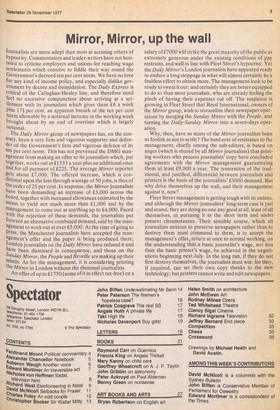Mirror, Mirror, up the wall
Journalists are more adept than most at accusing others of hypocrisy. Commentators and leader-writers have not hesitated to criticise employers and unions for reaching wage settlements which contrive to fiddle their way round the Government's decreed ten per cent norm. We have no love for any kind of income policy, and especially dislike government by decree and intimidation. The Daily Express is critical of the Callaghan-Healey line, and therefore need feel no excessive compunction about arriving at a settlement with its journalists which gives them £4 a week Plus 174 per cent, an apparent breach of the ten per cent norm allowable by a notional increase in the working week brought about by an end of overtime which is largely notional.
The Daily Mirror group of newspapers has, on the contrary, been a very firm and vigorous supporter and defender of the Government's firm and vigorous defence of its ten per cent norm. This has not prevented the DMG management from making an offer to its journalists which, put together, works out at £1533 a year plus an additional once and for all payment of £225. The average Mirror reporter gets about £7,000. The offered increase, which is conditional upon the loss through wastage of 50 jobs, is thus of the order of 25 percent. In response, the Mirror journalists have been demanding an increase of £3,000 across the board, together with increased allowances estimated by the union to yield not much more than £1,000 and by the management to come out at anything up to £4,000. Faced With the rejection of these demands, the journalists put forward an alternative combined demand, said by the management to work out at over £5,000. At the time of going to Press, the Manchester journalists have accepted the management's offer and the paper is being produced there; London journalists on the Daily Mirror have refused it and have been dismissed in consequence, and those on the Sunday Mirror, the People and Reveille are making up their Minds. As for the management, it is considering printing the Mirror in London without the dismissal journalists. An offer of up to £1750 (some of it in effect tax-free) on a salary of £7000 will strike the great majority of the public as extremely generous under the existing conditions of pay restraint, and well in line with Fleet Street's hypocrisy. Yet the Daily Mirror's London journalists have appeared ready to endure a long stoppage in what will almost certainly be a fruitless effort to obtain more. The management look to be ready to sweat it out: and certainly they are better equipped to do so than most journalists, who are already feeling the pinch of having their expenses cut off. The suspicion is growing in Fleet Street that Reed International, owners of the Mirror group, wish to streamline their newspaper operations by merging the Sunday Mirror with the People, and turning the Daily-Sunday Mirror into a seven-days operation.
Why, then,, have so many of the Mirror journalists been so foolish as not to settle? The hard core of resistance to the management, chiefly among the sub-editors, is based on anger (which is shared by all Mirror journalists) that printing workers who process journalists' copy have concluded agreements with the Mirror management guaranteeing them at least £9,000 a year. The restoration of the traditional, and justified, differential between journalists and printers is the basis of the journalists' £3000 demand. But why drive themselves up the wall, and their management against it, now?
Fleet Street management is getting tough with its unions, and although the Mirror journalists' long-term case is just and sound, they are doing no one any good at all, least of all themselves, in pursuing it in the short term and under present circumstances. Their sensible course, which all journalists anxious to preserve newspapers rather than to destroy them must commend to them, is to accept the management's offer, return at once to normal working, on the understanding that a basic journalist's wage, not less than the basic printer's wage, be achieved in the negotiations beginning next July. In the long run, if they do not first destroy themselves, the journalists must win: for they, if required, can set their own copy thanks to the new technology; but printers cannot write and edit newspapers.






































 Previous page
Previous page